14 Types of Curtains and How to Choose One
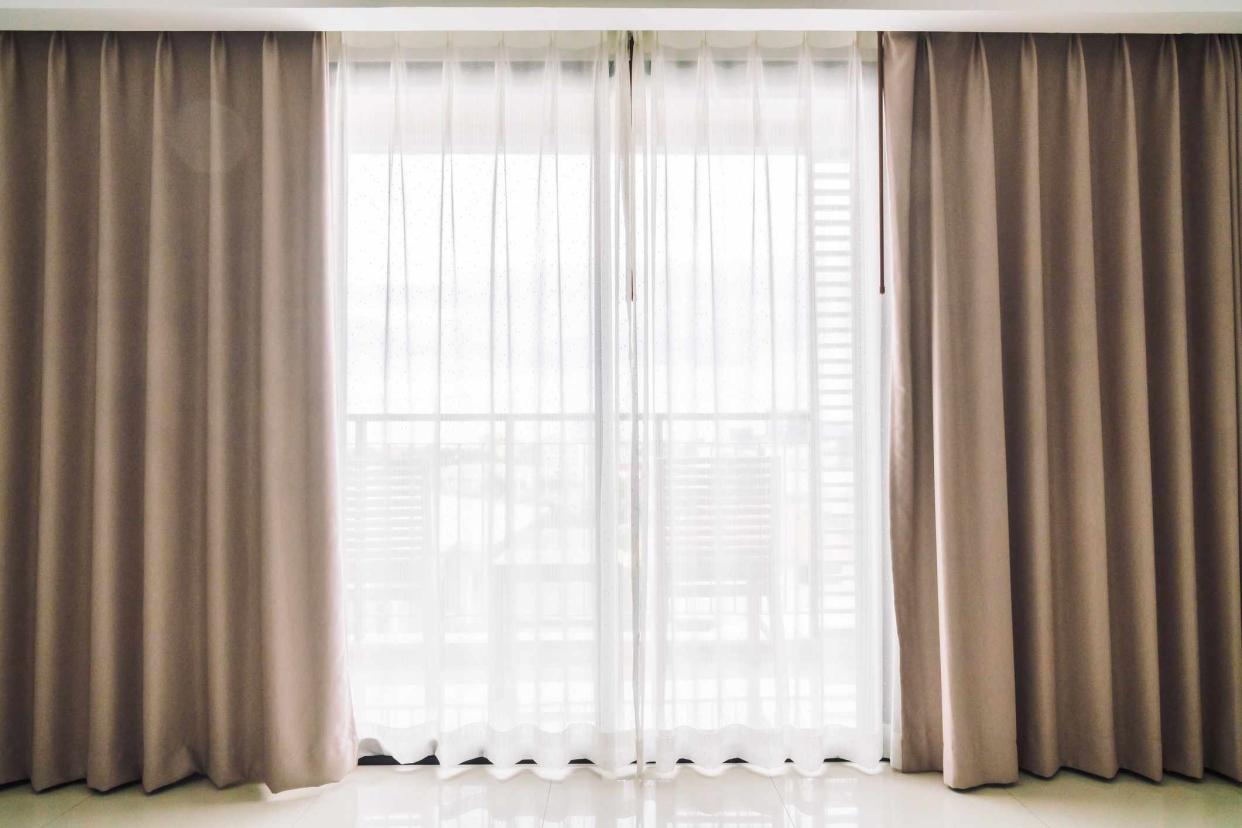
Siraphol Siricharattakul / EyeEm / Getty Images
Curtains and window treatments in general are an often overlooked but essential component of a room. Besides their practical function of blocking out light, they act as the final finishing layer that completes a space—they are a great way to add a splash of color and a pop of pattern. There are countless different types of curtains available on the market—they come in different styles, lengths, and materials, and some are best suited for one room in your home versus another. Use our comprehensive guide below to choose the right type of curtains for your home.
Blackout Curtains
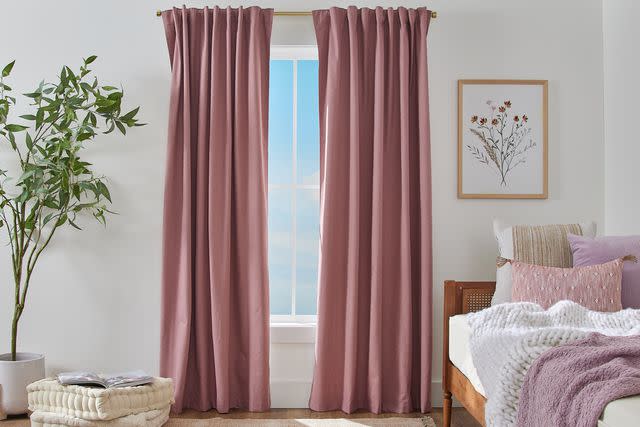
The Spruce / Jacob Fox
Best for: bedrooms
Blackout curtains completely block out light and allow for complete darkness to promote a good night's sleep. They have a lining that's thickly woven and doesn't allow for any light to filter through. Besides regulating light, blackout curtains also help with temperature regulation and keep drafts out in the winter and hot air in the summer. This set from Deconovo is a great example.
Curtains With Tiebacks
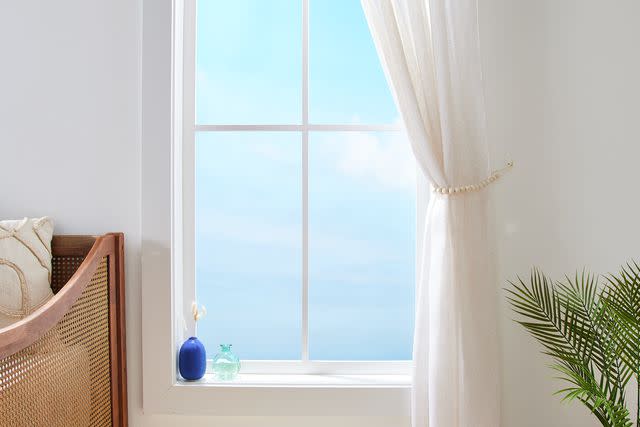
The Spruce / Jacob Fox
Best for: bedrooms and living rooms
Curtain tiebacks are a decorative and practical addition to window panels. They typically come with the curtains and are made from the same material—you'll also see them made from woven cords and embellished with tassels, or made from a complementing fabric or pattern. They are kept in place with two loops on either end secured in a hook on the wall.
Pleated Panel Curtains
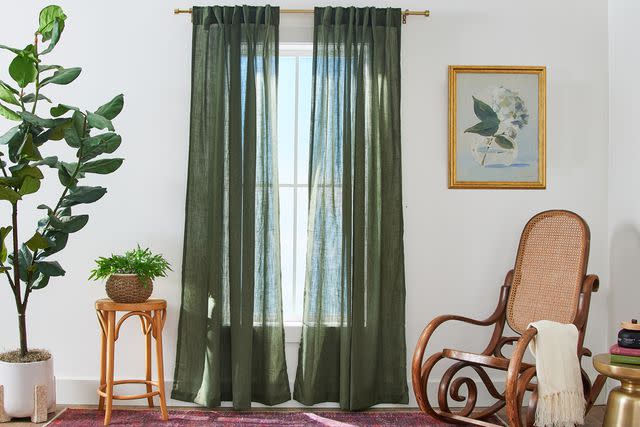
The Spruce / Jacob Fox
Best for: formal living spaces and bedrooms
If you want to add an elegant and slightly dressy look to your windows, pleated panel curtains are a beautiful choice. The pleats are made from multiple fabric folds bunched together to create fullness and they gently hang in a uniform fashion for a timeless and sophisticated feel.
Single Panel Curtains
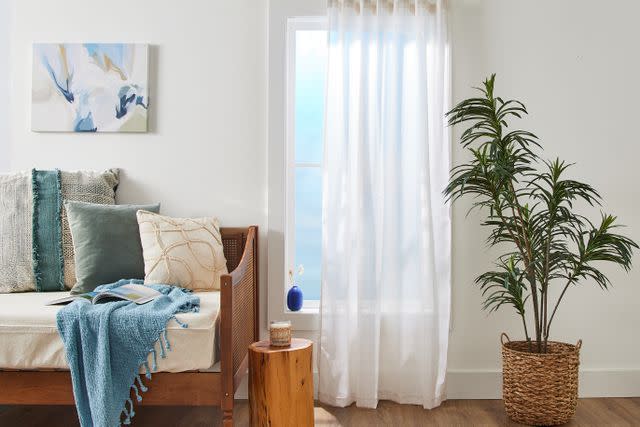
The Spruce / Jacob Fox
Best for: small windows, a modern look
A smaller window may only require one curtain panel instead of two. It's typically made from one continuous piece of fabric, and you can always purchase two panels for either side of the window, or even double up on panels on both sides for larger windows or sliding doors.
Double Panel Curtains
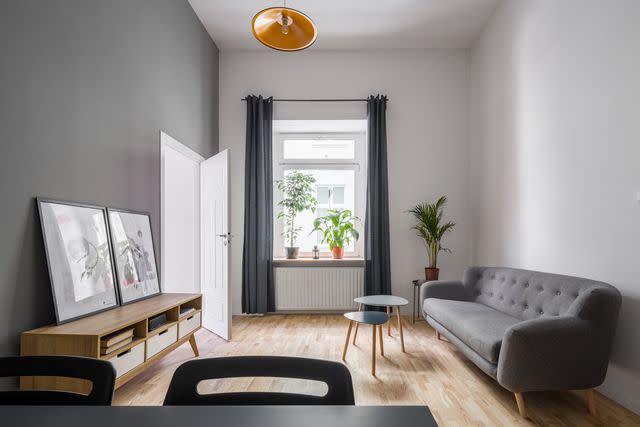
in4mal / Getty Images
Best for: bay windows, French and sliding doors
As the name suggests, double curtain panels are formed from two single panels on each side of the window. When purchasing your window treatments, make sure to carefully read the product description to see whether it contains one or two panels.
Pinch Pleat Curtains
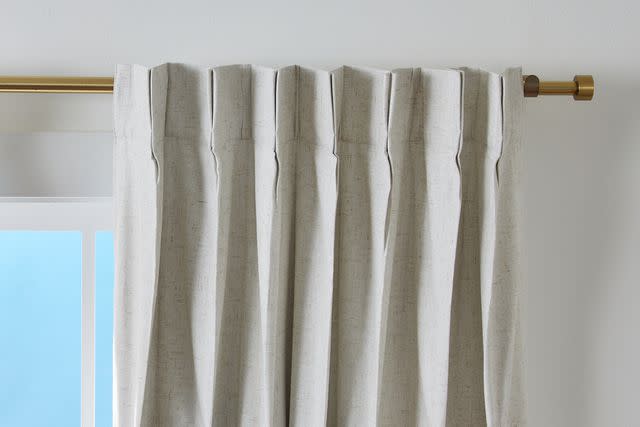
The Spruce / Jacob Fox
Best for: formal living spaces and bedrooms
If you're looking for curtains with a little bit of extra detailing, pinch pleat curtains will add a decorative touch to your windows. A classic pinch pleat is made from three tight fabric folds that form a fan-like detail at the top of the curtain panel, with the pleats gently fanning out toward the ground.
Grommet Curtains
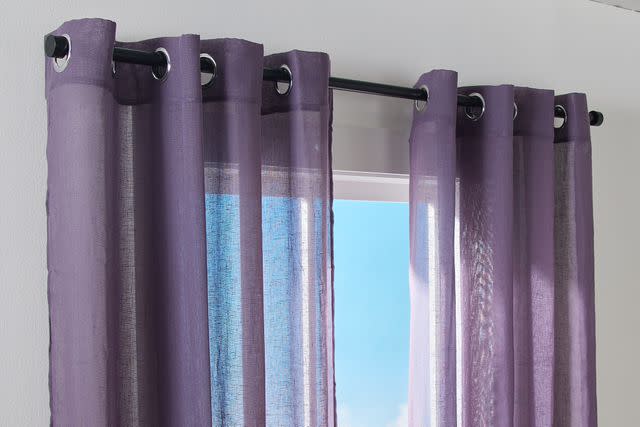
The Spruce / Jacob Fox
Best for: windows where you frequently open and close the curtains
Grommet curtains are easy to open and close quickly thanks to how well they slide along the rod. The panels have round metal rings built into the top part that eliminate the need for curtain rings since the rod slides directly through the holes punched into the fabric. These curtains create a clean, modern, and uncluttered look that's perfect for streamlined, contemporary, and transitional spaces.
Cafe Curtains
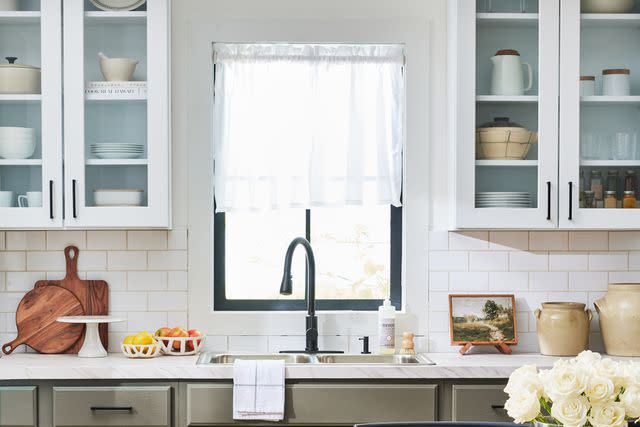
The Spruce / Jason Donnelly
Best for: kitchens and bathrooms
Cafe curtains differ from other types of curtains in that they only cover the bottom portion of the window, therefore allowing light to filter in through the top part while still providing privacy. They can easily be installed using a small tension rod instead of a permanent rod, and are most commonly used in spaces such as kitchens and bathrooms.
Tab Top Curtains
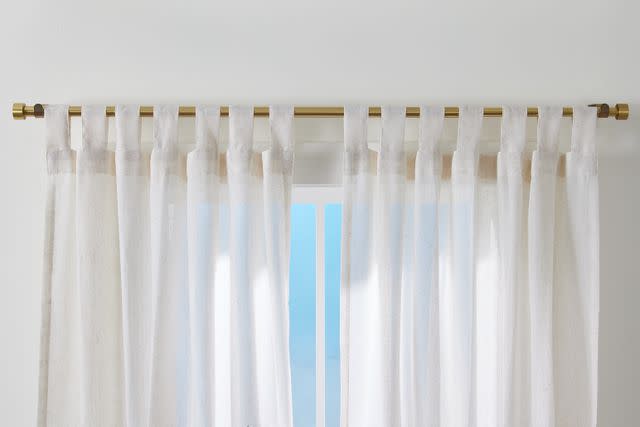
The Spruce / Jacob Fox
Best for: informal spaces
Tab top curtains are designed with loops at the top that are made from the same fabric as the panel and that hang directly from a curtain rod. Like grommet and rod pocket curtains, they don't require curtain rings, and sometimes instead of sewn-on loops, they have sewn-on ties that add an extra decorative feature to them.
Floor Length Curtains
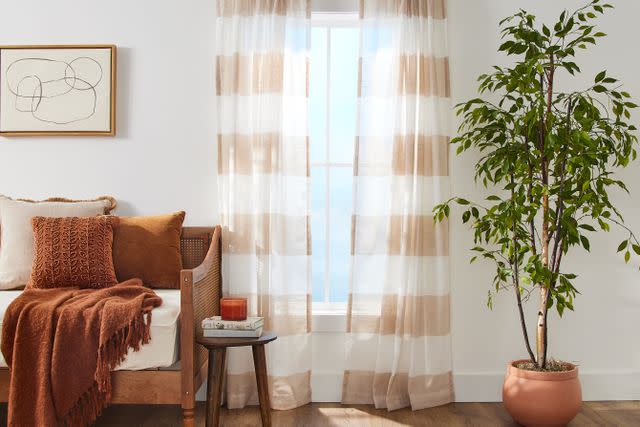
The Spruce / Jacob Fox
Best for: living spaces, bedrooms
To visually extend the height of the ceiling and to make a room feel larger, use floor-length curtains. People tend to hang curtains way too low which makes the ceiling appear low and heavy, so the general rule of thumb is to hang them two-thirds of the way between the window and ceiling, closer to the ceiling.
Apron Length Curtains
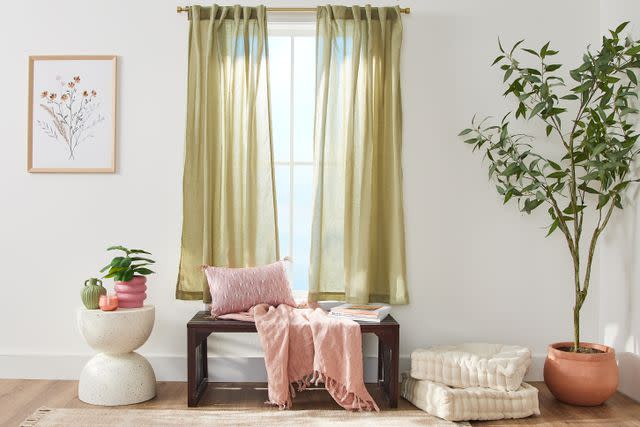
The Spruce / Jacob Fox
Best for: kitchens, bathrooms, and rooms where the space under the window is blocked
Apron-length curtains fall just below the window sill. They are generally not as popular as they were in decades past, but they are a good choice for spaces that have a piece of furniture or a heater directly under the window.
Puddle Length Curtains
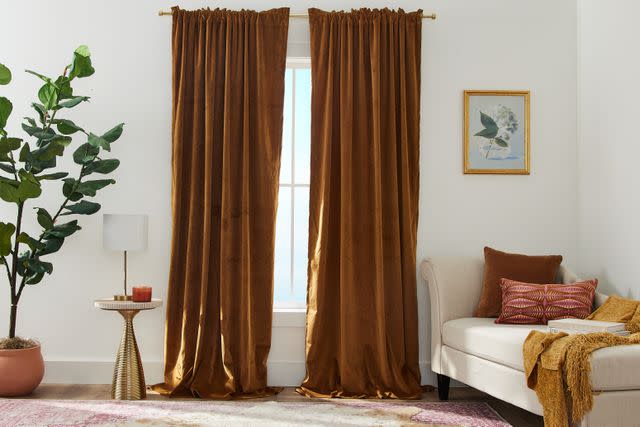
The Spruce / Jacob Fox
Best for: living spaces and bedrooms
Puddling refers to the length of the curtain panel—instead of just touching the ground or having a one-inch break, puddle-length curtains literally "puddle" on the ground to create a dramatic yet soft look. The only drawback to this style of curtains is that they can collect a lot of dust resulting in the need for more frequent washing.
Light Filtering Curtains
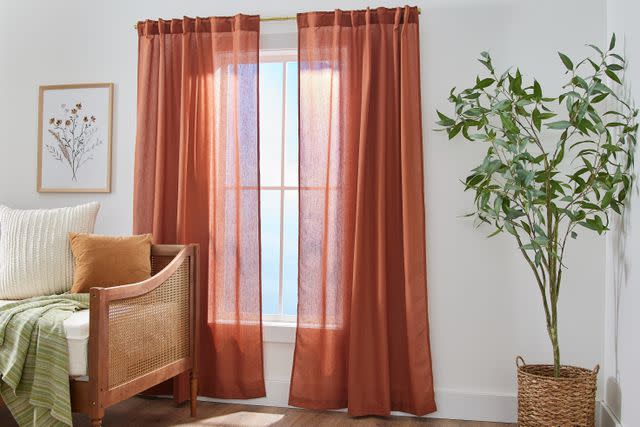
The Spruce / Jacob Fox
Best for: rooms where you don't need complete darkness
Light-filtering curtains aren't completely see-through like sheer curtains are, but they let in much more light than room-darkening or blackout curtains. They provide a little bit of privacy and block direct sunlight while allowing plenty of light to filter in. They are made from thinner, loosely woven fabrics that are lightweight, usually cotton or polyester.
Window Scarf Curtains
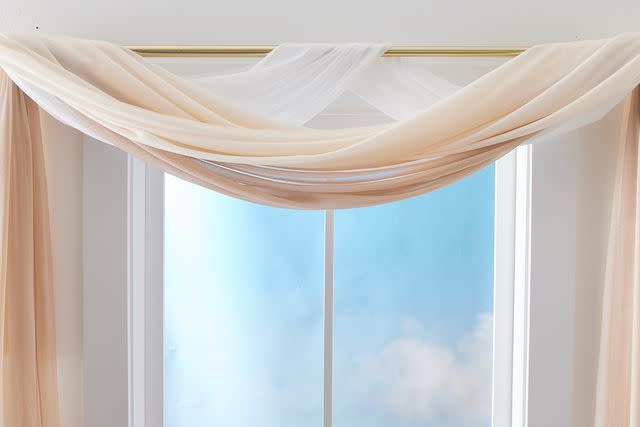
The Spruce / Jacob Fox
Best for: traditional-style and formal rooms
You will mainly see window scarf curtains in traditional-style rooms, their fabric often coordinating or matching the upholstery in the room. These curtains are typically made from three pieces—two curtain panels and a decorative valance on top that drapes over the panels like a scarf.
Choosing Curtains
To choose the right type of curtains for your home, go through a checklist of questions to narrow down your choice. First, consider what room they will hang in; for example, the type of curtains you choose for a bedroom will be very different from those you would need for a kitchen window. Then, decide how much light you want them to filter through, whether you will be sleeping in the room and need to block out all light like blackout curtains do, or you want them to softly diffuse sunlight like light-filtering curtains do. Keep the style of your home in mind to help them blend in, take careful measurements, and follow this hanging guide to hang curtains like a designer.
Read the original article on The Spruce.

